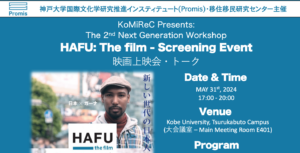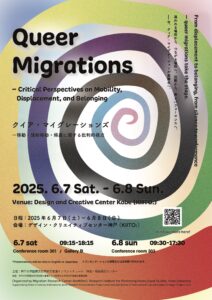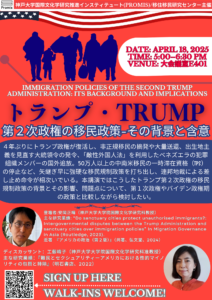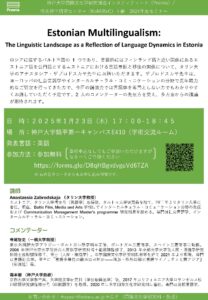Message from the Director of the Center of Migration Research
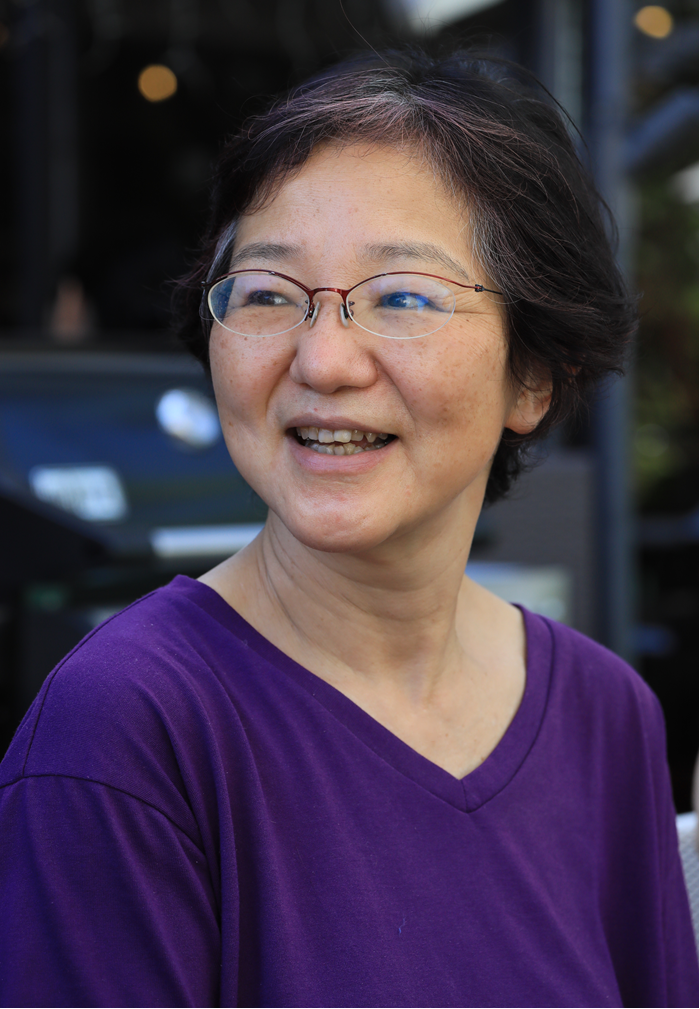
Kaoru Aoyama
Human beings have always been on the move, migrating near and far, since the time of their emergence to the present. Migration is in fact said to be a characteristic of human beings. The Kobe Migration Research Center (KoMiReC) recognizes and explores the importance of human mobility, especially since the modern era, and uncovers the relationship between personal mobility and national borders. People move across borders for a variety of reasons: colonization, work requirements, study and research, lifestyle, relationships, war/conflict, oppression, famine, and hunger. Borders, which in recent years have been “lowered” and “blurred” by globalization, however, still impede and channel our movements. Migrants, including global workers, foreigners, refugees, and international students, are thus constructed and divided from the citizens of host countries. Public relationships over nationality and citizenship, intimate relationships over love and affection, and relationships over markets and economy are redefined on the basis of division and conflict. This division and conflict are created by the relationship between the already transnational society and the state and national borders. On the other hand, the encounter between migrants and the host population is not only driving, and driven by, political economy, but also brings about cultural, artistic, informational, and linguistic exchanges and stimulates creativity. KoMiReC captures this complex and dynamic world and pinpoints how global yet national governance, management, and social order work. At the same time, KoMiReC will develop academic research and exchanges that emphasize the world of individuals’ survival strategies.
Herein lies the significance of the fact that KoMiReC was established at the initiative of the Graduate School of Intercultural Studies of Kobe University.
Kobe is a city which developed around a port that opened modern Japan to the world. The port became a trading hub for various countries, welcomed immigrants, established foreign settlements, experienced multiculturalism and multi-religion, and is, even after the war and the earthquake, still a hub for trade and tourism today. The same port also sent out the first “emigrant ship” as a state policy, bound for Brazil. Japan, which became an emigrant-sending nation when it opened its borders to the outside world, sent workers to the Pacific Ocean region, starting with Hawaii, and then the North American continent, but the emigrants suffered from poor working conditions and exclusionist movements that saw them as “job-stealing” strangers with mysterious customs and low wages. Even the emigration policy to Brazil, which was supposed to be a way out of the exclusionism of the other countries, tormented the emigrants by subjecting them to conditions reminiscent of slavery, which had been legally abolished, despite the promises of dreams and hopes that were made at the time of recruitment. The fact that foreign nationals, represented by technical trainees, are undergoing very similar experiences in contemporary Japan is something that needs to be deeply understood and widely known. It seems clear that we who live and study in Kobe, which embodies the modern history of migration, should play a part in this work.
Kobe University's Graduate School of Intercultural Studies and its Research Institute (Promis), as an interdisciplinary research organization that addresses issues in modern and post-modern human societies, has researchers specializing in the humanities, social sciences, arts, and information sciences, and promotes collaboration among them. It also encourages collaboration driven by each researcher with the fields of education, policy making, corporate activities, and social movements, both inside and outside the university. It is precisely this kind of interdisciplinary approach that is necessary to understand the mobility that characterizes human beings and to address its challenges. KoMiReC is born out of this necessity. It is well-positioned to explore the relationships brought about by human migration and mobility, as well as the changes and reorganization of social structures, due both to the history of Kobe city and the accumulation of interdisciplinary knowledge and practices. It is essential for migration studies to make a shift from narrow discipline-based approaches that confine slavery to history, refugees to refugee studies, nationality to political science, second language acquisition to linguistics, diaspora literature to literary studies, international marriage to gender studies, and “migrant ships” to local history. KoMiReC addresses migration as a complex phenomenon that shapes our society and generates new rationalities and relationships, information distribution and productivity, new creativity, art and language. For migration is not only the circulation of people, neither only the circulation of production and reproduction, but also the deposition and circulation of knowledge and humanity.
Kaoru Aoyama, Director of Kobe Migration Research Center
Co-Deputy Directors’ Statement
It is an honour and privilege to serve as co-deputy directors of the Kobe Migration Research Center (KoMiReC), a burgeoning meeting place for migration research in the city of Kobe, the Kansai region, and – why not! – the world. Nurtured by the inherently interdisciplinary spirit of PROMIS and the Graduate School of Intercultural Studies, the Center seeks to probe the farthest reaches of “migration research”: from the mobility and immobility of people across borders, both national and otherwise, to the ways that borders cross people in the wake of seismic political and social change; from multiple expressions and representations of hybridity, mixedness, and flow, to the rising tide of walls, exploitative immigration regimes, and outsourced migration “management”; and from the unruly circulation of practices, ideas, and languages, to people’s (or non-human beings’) everyday resistance to being fixed in place.
The Center’s members and affiliated researchers bring a wide range of interests and expertise, including but not limited to gender, sexuality, and queer migration, asylum policy and the ethics of migration governance, philosophical engagements with dilemmas of modernity, research on memory, generations, and affect, literary travels and transformations, critical approaches to tourism and lifestyle mobilities, racial subjectivities and racialized structures, innovative information science data approaches, linguistics and questions of translation, postcolonial and postimperial legacies, and comparative and relational research methodologies – all cutting across academic disciplines. Over the next several years, our goal is both to bring together existing research networks and forge new ones to create a space for mutual discussion and a launchpad for new projects. We warmly invite you to join us in expanding the reach of individual research into fruitful collaboration, as we collectively build on the port city of Kobe’s history of cross-border connection and cultural exchange.
Haruko Kudo, Deputy Director of Kobe Migration Research Center
Špela DRNOVŠEK ZORKO, Deputy Director of Kobe Migration Research Center

